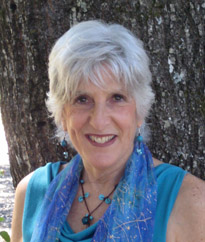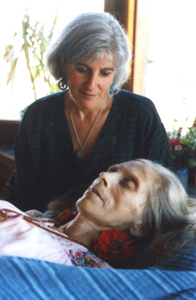Today SevenPonds speaks with Jerrigrace Lyons who is a family funeral guide and educator—one of the original pioneers of the home funeral movement. She is a founding member of the Home Funeral Alliance, and the founder and director of Final Passages, through which she both guides families and certifies home funeral consultants. This is Part One of her two-part interview with SevenPonds—read the Introduction here.
 Aurora: What is your favorite part of your job as a home funeral guide?
Aurora: What is your favorite part of your job as a home funeral guide?
Jerrigrace: My favorite part is helping people—being of service and watching them transform through the experience of a home funeral… moving from fear and anxiety to a place of wellbeing and peace, healing even to the point of joy, joy that they have been able to participate fully in the passage of a loved one.
Aurora: What language do you use for what you do, and why?
Jerrigrace: When I started this work, I had to create language for what I was doing. I was coauthoring a guidebook with a good friend of mine, who at the time co-directed Final Passages with me—and while writing it, we realized that this was something new, that required new language to make people understand what we were talking about.
We created the term home funeral, which doesn’t necessarily mean people are at home—sometimes I interchange it with family–directed funeral for this reason. I believe it’s important to have language that unifies us as a movement—language everyone can understand. For instance, at first, I kept saying “cremation dock,” but people thought I meant a box for the ashes, when I was referring to the rectangular cardboard box used to place the body into the crematorium chamber for cremation. I had to start calling it a cardboard cremation casket to make it completely clear.
Another term created was lying in honor; we could say a wake at home, but we were looking for new terms to match the new rituals that we were creating around people remaining at home. We were looking for something more modern that people could relate to. Lying in honor or lying in grace is like lying in state, but we use this term to mean the time that the deceased is at home before being taken to the crematorium or cemetery.
Jerrigrace: Recently there was a group of about 10 or 12 women who had gone through our home funeral courses here in California, and were just getting to meet one another and having casual meetings, much like our group. The Board of Funeral Directors or someone on it saw their website, contacted one of the women, and forcefully invited her to one of their meetings—the woman explained what she was doing.
Next thing they knew, there was a bill saying these women could not help families and get paid for it unless they were operating under a special license. This bill was rushed right through—when it passed and the funeral directors created the licensing procedure, the term they were using was death care consultants. The women went to hearings and objected to this term, explaining that they were family funeral assistants or home funeral guides. The people in charge of licensing ignored them and their intelligence—their ability to be compassionate helpers for families in need.
Then the test created to meet the licensing requirement didn’t even pertain to the work we do. It asked for a lot of technical information funeral directors need to know. On top of that, the way the licensing reads, even if you do pass the test, you can’t really help the family after the person has died. It was basically a gag order. So now the women aren’t getting licensed because they’d rather go out and help families for free.
It is a truly ridiculous law and I hope it gets reversed one day.
Aurora: Can you give us a step-by-step of what you do as a home funeral consultant?
Jerrigrace: If a family calls me in ahead of death (and preferably they do), I meet with them and give them all their options, go over all components of a home funeral; and then, if they decide they want me to guide them, we go over all the paperwork and talk about if they want cremation or burial, casket options, etc., and take it from there…
When a person dies and the family calls me to come over, they could be asking me for services from simple paperwork assistance to the whole nine yards—what I call a “full service” home funeral: I type and file paperwork, and go with them to the crematorium to make arrangements, or to cemetery, to hopefully choose a green burial. I wash, prepare, and dress the body, including clothing, hair and makeup (if they want any). I bring a massage table if the family doesn’t have a place for the person to lay in honor. I have material to drape on tables. I often bring a cardboard cremation casket so loved ones may decorate it, and then I help them place the body in the casket and van or car to transport the body to the crematorium or cemetery.
I basically walk beside the family every step of the way so they feel like they’re in charge, because they are. I am a legal consultant, but I also assist with ritual along the way. Really, home funeral is a ritual in itself.
Aurora: Thank you so much, Jerrigrace!
You can read part two here.

 What Is a Home Funeral Guide? An Interview with Jerrigrace Lyons: Part One
What Is a Home Funeral Guide? An Interview with Jerrigrace Lyons: Part One



 “Making Mobiles” by Karolina Merska
“Making Mobiles” by Karolina Merska
 “Hands Up to the Sky” by Michael Franti & Spearhead
“Hands Up to the Sky” by Michael Franti & Spearhead
 Coping With Election Grief
Coping With Election Grief














